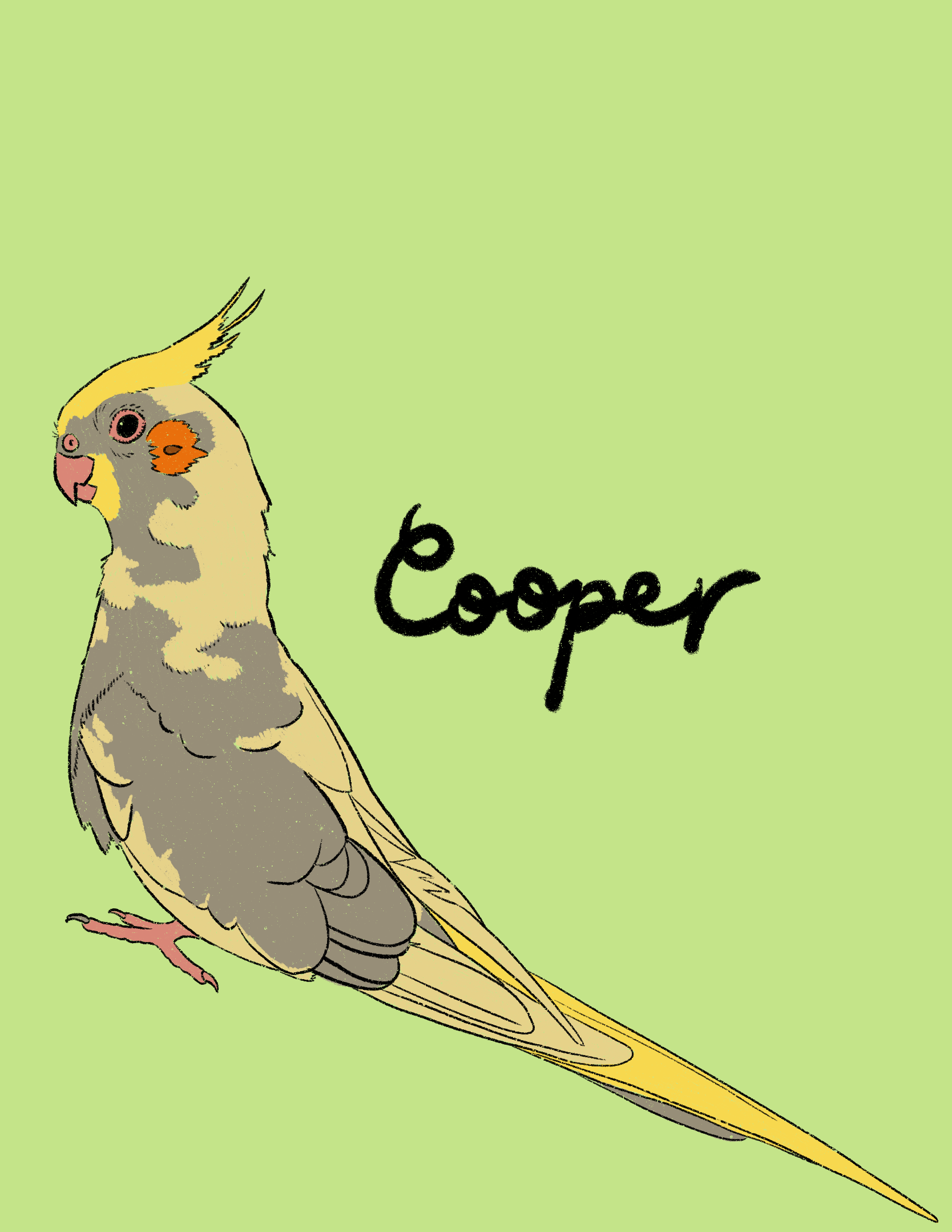I’ve lived with a cockatiel named Cooper for the better part of a year now, and I think I’ve gathered enough thoughts and experiences by now to write a blog post. This post will be about owning a parrot (being a “parront” in aviculture parlance); I won’t be able to tell you what it’s like to own chickens, ducks, or doves.
Parrots have a lot in common with primates. They are social frugivores, and are smart in ways we can recognize. They like to play, they are very expressive, they’re dextrous, and they have a sense of humor. All of these traits make them great companions, but for the same reasons, they require more attention and enrichment than a less-intelligent pet.
There are two main families of parrots, the parrots and the cockatoos. Cockatoos (including cockatiels, though this was only confirmed recently) have head crests and only come in the same warm-color palette as mammals–red, yellow, brown, black, orange, pink, and white. Parrots (including conures, lories, caiques, budgies, and others) are bare-headed but are capable of the full rainbow of colors. They are often green to better blend in with jungle foliage, but with other colors as accents on the head and wings. Some are wildly colorful, like the rainbow lorikeet (which does not make a good pet for many reasons):
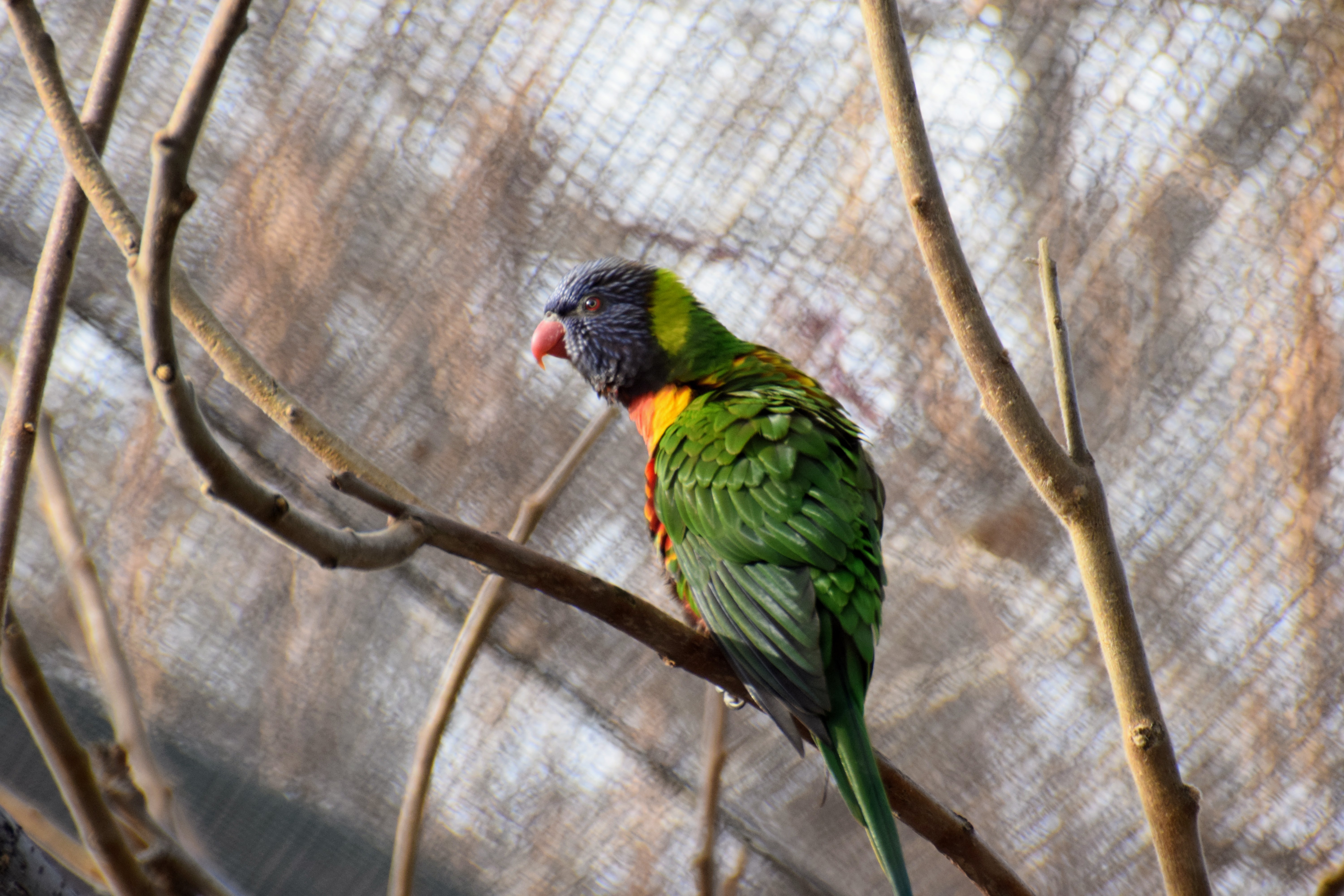
While all parrots are smart and many can mimic human speech, some are definitely smarter than others. As I described in my bird brain post, intelligence depends a lot on sheer brain size. Therefore, we would predict that larger parrots are in general smarter than smaller ones, which is indeed what we find. Goffin’s cockatoos are capable of toolkit use (selecting the right tools for a multi-step job) [1], and African greys are famously known to understand hundreds of English words well enough to answer novel questions. Cockatiels and budgies, however…aren’t exactly known for their feats of ingenuity. Cockatiel owners have a running joke that all cockatiels share the same brain cell and can only think while others are not using it.
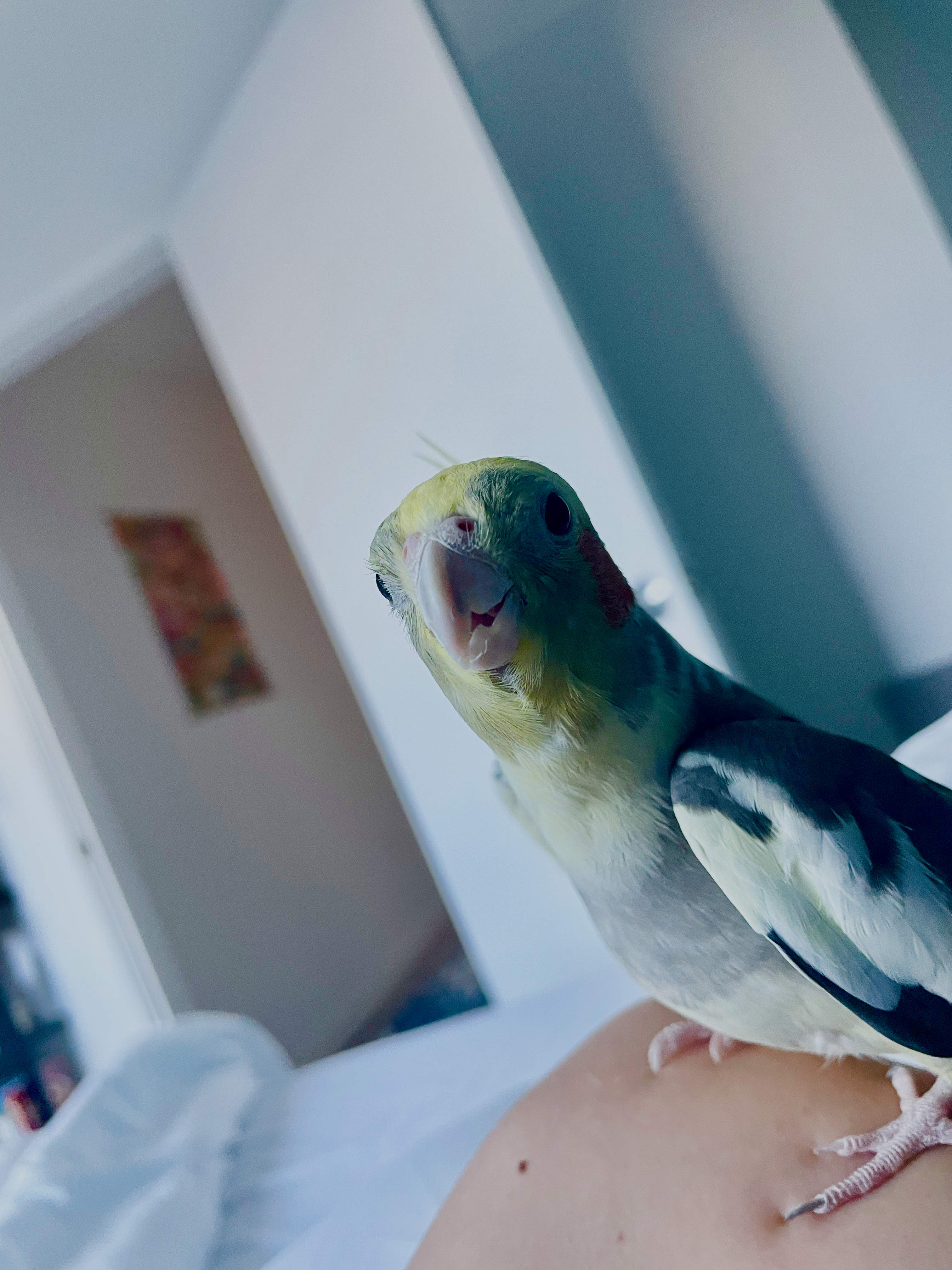
That’s not to say they’re dumb, though. Even a cockatiel is leagues smarter than a dog or cat. While a bird is dependent on you for its food and healthcare, the relationship is less subservient than other kinds of pets. They value their independence, and you have to earn their respect and trust.
They’re the clowns of the bird world.
Parrots are possibly the only pet that will play tricks on you. They have been known to order things using Alexa, mimic a phone alarm to get their owner to go searching for the device, and talk to spam callers on the phone. They learn skills easily, such as going potty on command in the cage or returning to your shoulder, but may not care to do them when you ask. (Instead of doing the action, it turns into a game of repeat after me. “Go potty!” “Go potty!” “No, you go potty!”)
I’ve seen a video of a cockatiel and their human playing a spontaneous game of yelling back and forth through a paper-towel tube. They both think it’s hilarious and are having a great time.
The last common ancestor we share with birds was a very early amniote back in the Carboniferous Period, over 300 million years ago. That cold-blooded, lizard-like animal was definitely not very smart and probably did not have a very well-developed sense of humor. That means everything we recognize in birds as being similar to our intelligence evolved independently, and we happened to end up thinking the same kinds of things were funny. Is there an absolute property of a situation that makes it objectively funny? Would aliens enjoy the same things?
They’re very curious.
A bird will try to figure out how things work. When I first brought home my electric piano, Cooper was puzzled how I could be pushing the keys in one area but the sound was coming out of the speakers elsewhere. He kept putting his ear to the speaker, then looking at me in a puzzled way.
He also has the flow of Super Smash Bros figured out. Before a match, he’ll be sitting under my chin getting scritches as I wait for the other player to join. During the match, he moves to my shoulder and sits quietly, knowing my hands are busy. When the victory music plays, he sings along in a celebratory manner (even if I lose).
As an aside, I think Pikachu must have been inspired by cockatiels. I’m a Pichu main; do you think Cooper recognizes anything of the character?
Often, Cooper’s curiosity gets in the way. My husband will be making coffee, and Cooper will keep trying to climb down his arm to get a better look at what’s going on. Or, he’ll get too close to knives or the hot stove and we have to put him back in the cage until we’re done cooking.
They hold grudges.
One reason people say they like dogs is because a dog will love you unconditionally and not judge you for anything. Parrots are definitely not like that. They get offended at common transgressions, like if you go away for the weekend and leave them with a pet sitter, or if you have to grab them with a towel to give them medicine, or if you wrestle them into a harness to take them outside, and will give you the cold shoulder for days or weeks afterward. They’re also slow to trust; if you adopt a bird who has been mistreated or neglected, it can take years to even get them comfortable enough to step up onto your hand.
Because of the risk of a parrot’s wrath, many owners overcompensate and spend all their free time entertaining their birds. This is obviously what the birds want, but often leads to anxiety and burnout in the owner. It’s important to set boundaries and take small liberties or you could end up resenting your bird for its impact on your life.
Parrots are also very fickle, a little like cats. Your scritching can cause bliss one second and biting the next. They sometimes choose a particular human or object as a “mate” and aggressively defend it from others. Some mornings, they’re happy to hang out with you and play with toys, while others they just want to perch up high without being bothered. Learning to read their body language is important for avoiding too many nips, which is crucial if you have a larger bird with a beak that can do real damage.
They need a lot of space.
Unfortunately, most birdcages available at big box stores are one or two sizes too small for the bird they’re advertised for. My cockatiel is in a 30” x 30” x 43” cage, which is advertised as being for large parrots like African greys or Amazons. The cage from the same store marketed at cockatiels, at 17” x 24” x 30”, might be suitable for a finch, and the cage marketed at finches, at 13” x 11” x 16”, is really only a transport cage for short car rides. I think this is something pet stores do to lower the percieved barrier to entry to buying a bird. If even the smallest parrot is going to take up a quarter of your living room and cost over $500 up front, fewer people would spring for one.
In addition to a large cage, parrots need opportunities to fly around outside the cage. This can be problematic if you have a large bird with a can opener for a face; all your ceiling mouldings and door frames will be reduced to wood chips in short order. It can also be difficult to wrangle the bird back into the cage if your house has high ceilings. Fortunately, I don’t have either of these problems, as I live in an apartment with a bird whose bite can’t even break skin.
Parrots are also extremely messy. In the wild, dogs and cats are used to doing their business in a designated area, because they live in dens that they don’t want to soil. Birds, however, live in trees, and when they poo, they never encounter that turd again. (Some baby birds excrete “poo sacks” that the parents remove from the nest or even consume, but they only do this for the first couple weeks of their lives.) Birds’ fast metabolisms also mean that they poo every ten to fifteen minutes. That’s a lot of individual items to keep track of in the home! It’s inevitable that one will get missed, only to reappear later as a dried ball or as a hard-to-clean smear.
There’s also the issue of dander. Some birds use oil to keep their feathers waterproof, while others use “powder down”, or feathers that crumble into a fine dandruffy powder when preened. Some people are allergic to this kind of feather, so it’s a good idea to keep lots of air filters running if you have this kind of bird.
Finally, they’re extremely messy eaters. They don’t have cheeks, which means they have to chew food into swallowable pieces outside their mouths, resulting in food debris everywhere. Sometimes they also just fling food around for fun. A “seed skirt” around the cage, a TidySeed (a type of mess-reducing food bowl), and a good vacuum cleaner are all indispensible tools for mitigating this.
It’s easy to accidentally kill them.
Birds have super-efficient lungs, so they absorb a lot more of whatever’s in the air per breath. They’re also very small, so it takes less of a substance to affect them. This means that a single absent-minded spray of Febreeze or Teflon pot left heating on the stove can instantly kill them. When you adopt a bird, basically anything aerosolized becomes off-limits, including perfume, scented candles, Teflon-coated hair dryers, and most cleaning products.
It’s also tragically common for owners to step on or otherwise crush their bird by accident. A cockatiel weighs about as much as a mouse, but acts like a cat, so it’s easy to forget how delicate they are. One misstep, slammed door, or unintentional nap could kill.
Similarly to dogs, birds can eat most human foods, but some innocuous-seeming ones are toxic to them, such as avocado, onion, and chocolate. Since they’re so small it’s also easy for them to overdose on salt or iron, so owners have to take care to regulate what the bird is eating. Many common potted plants are also deadly, and since parrots are naturally herbivores, they don’t exercise the same caution with unknown plants that humans instinctively do [2].
They’re extremely loud.
Imagine having a roommate, a full-grown man, who sometimes spontaneously yells at the absolute top of his lungs in the living room, even when you’re right next to him. This is what having a large bird is like. Smaller birds, while still capable of causing tinnitus, aren’t quite as likely to invite noise complaints. The only way to make them be quiet is to cover the cage with a dark cloth, triggering their instinct of “it’s night, predators are about”. Obviously, leaving your bird in the dark all the time is bad for their mental health, which will cause more screaming when uncovered, so it’s impossible to entirely prevent it. If this is an issue where or with whom you live, a bird is not the pet for you.
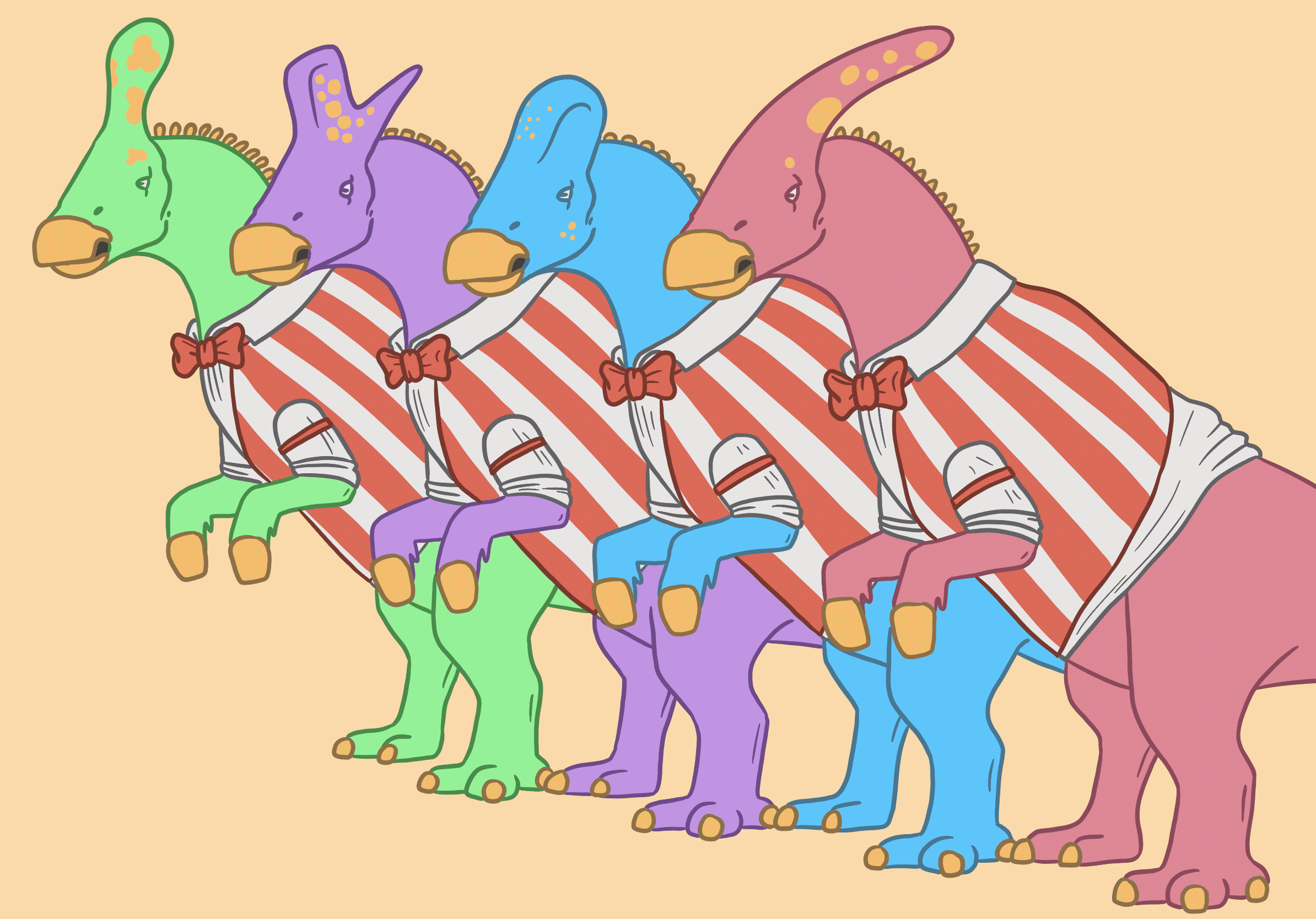
They’re creatures of habit.
Parrots are strongly tied to the sun’s schedule; they sleep when it’s dark and wake when it lightens. This means that it’s very difficult to sleep in on the weekends, as the bird will be begging to be let out at dawn. (My strategy is to let him out for an hour and then go back to sleep.) It also means that if your birdcage is in the living room (a preferred location, as parrots like to observe any activity that’s happening), if you stay up past dusk like a normal human, you’re interfering with their sleep. Again, one solution is to cover the cage, but some birds prefer being able to navigate the perches at night.
Most parrots are very resistant to trying new things, like new foods, new toys, or new arrangements of the cage. Parrot owners have many strategies for persuading their birds to try new things, such as eating the food themselves (not desirable if the food is kibble), putting millet (a type of seed parrots love) on or around the new object, or introducing changes graudally. However, I’ve never had an issue with this; Cooper is unusually neophilic.
Conclusion
Overall, I think a cockatiel might have been the best possible pet for my current lifestyle. Cooper doesn’t need a yard or outdoor walks like a dog, which are harder in a city, but provides more companionship and entertainment than a cat. The fact that he picks up new phrases and skills all the time makes watching his development exciting, like having a small child without the tantrums and diapers. Here’s a list of his phrases so far:
- Hi Cooper
- Step up
- Good bird
- Good job
- You’re such a good bird
- You did a good job
- You’re such a good job
- You did a good bird
- sponge mimicking noise and gesture (when I scrub at the sink, he goes ee-oo-ee-oo-ee-oo and bobs his head)
- Go potty
- Go potty Cooper
- C’mere tap tap (I tap my shoulder to try to get him to fly to me, but he just likes the percussive aspect and pecks on whatever’s nearby)
- tsk-tsk-tsk
And he’s only ten months old! We’re currently working on “I love you” and “bon soir”.
Another miscellaneous tidbit: parrots have a “yawn button”. If you scritch their ears (the orange “cheek” patches are actually their ears), it triggers repeated yawning. They seem to like it though. Do you think Tyrannosaurus would have yawned if you scritched its ears?
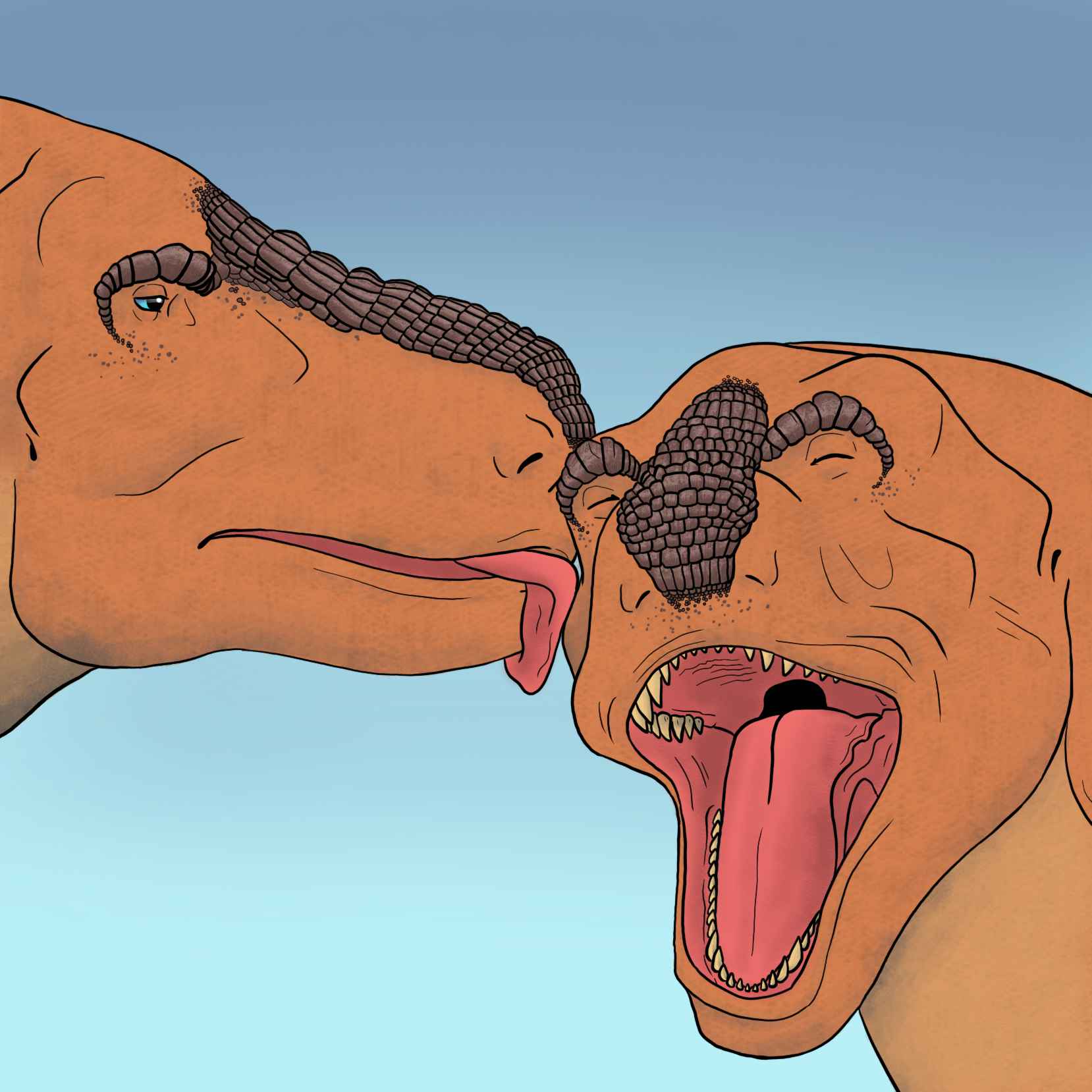
P.S. I now have a Zazzle store where you can have them print postcards and posters with my art on it. Cool!
References
[1] Goffin’s cockatoo toolkit use [2] Babies reluctant to touch plants

